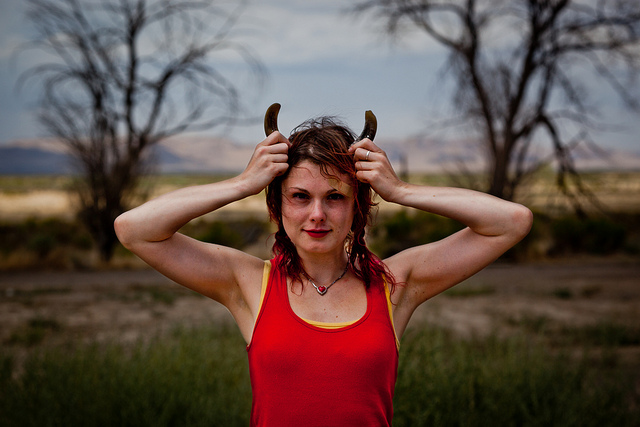We are humans. We are intelligent. We are creative. We are crafty.
Brilliant. Innovative.
We’ve created and discovered and managed and pioneered and built and learned—and so many other amazing verbs.
But we are also animals. We are roving, yearning, hungry, sexual, compassionate, playful, wise, instinctual and strong.
However, in today’s day and age, being polite, refined, good, calm, nice, tame, level-headed and civilized are all considered desirable traits. It is imperative that we “act like a lady” or “be a gentleman.” Seldom (if ever), do we hear the phrase “be a wolf” or “act like a lion.”
We are told to mind our Ps and Qs. We are indirectly taught to fit in and to blend in—and to keep in all of our passions, wild thoughts, ideas, dreams and the very things that set our souls ablaze.
In the midst of all the educating, civilizing and politicizing, our animalistic senses have gotten stifled. We are humans, yes—but we are also animals. Animals in the wild appear to have a keen understanding of the ebb and flow of life; they are instinctual, and so should we be.
Alert to each of their senses, animals respond to cues about their environment by trusting their instincts—and acting on them. When we rationalize what our instincts may tell us—or ignore them—we risk dismissing important signals about events, circumstances and the people around us.
So what can we learn from animals in the wild?
We must learn to again be like the bird, who—when put in impending danger—flees. She removes herself from that situation which will harm her. This is not cowardly, this is not weak—this is instinct. We must learn that it is okay not to stick around in situations with imminent danger. We must not be afraid to leave an abusive relationship, tumultuous work environment or ideology. If the impending threat will hurt our physical bodies, our self-worth or our values and morals, we must learn that it is often in our best interest to take flight.
It is vital that at times we also embody the wolf, who—when her cubs are at stake—will fight tooth and nail for what she believes. She will thrash and gnash and all the fur on her body will stand up, fighting for what she believes. She is strong, impassioned, fierce and focused. When something we strongly believe in or stand for is forcibly being taken from us, we have every right to stand up and fight for what we love.
It would do us good to learn from the swan, how to attend to our own kind. We would do best not to worry about the appearance, gender roles, sexual orientation or sexual promiscuity of those different than us. For some species, the man cares for the babies—for others, the female. Some animals exhibit homosexuality, others bisexuality and others heterosexuality. Some animals, like swans, mate for life, and some will take on several partners a week. The only thing that matters to the swan is herself and her partner. The coyote does not judge the mate choices of the fox, it simply allows them.
We should again learn to play like the dolphins—who will swim, flip, somersault and chase each other just for the fun of it. They will play with almost anything—coral, bubbles—they often even invent their own games. They jump and play and frolic and enjoy.
We can aspire to live in the present moment like the deer, who moves gracefully from eating berries, to grazing, to resting peacefully and is content to live life in the now.
So how do we return to these keen animal instincts and behaviors?
Fortunately, one can do many things to get closer to their inner-animal. Climb a tree. Spend 24 hours completely alone. Sleep outside. Pick berries. Play. Wander and adventure to a new place. Reflect. Flee from a situation that is no longer serving you. Fight and fight hard for what you believe in. Create. Show your teeth. Ruffle your feathers. Reconnect with the pieces of yourself that you have long lost.
I myself am a wolf in woman’s clothing—loyal, fierce, wandering, hungry and steadfast. Yet, I also am kind, generous, just, sweet and full.
At our core, we humans are dreamers. We have imagination. It is this characteristic which allows us to shape the world.
At our other core, we animals are doers. We have instinct. It is this characteristic which allows us to survive and thrive in the world.
To embrace the duality of our nature is to accept who we really are.
We must be both human and animal, civilized and uncivilized, wild and tame. We must be human in our thoughts, in our communication, in our ideas and creativity—but we must be animal in listening to our instincts.
We should strive to be civilized, just and deliberate in our actions—and uncivilized in our passions, loves and yearnings.
So let’s all go ahead and howl at the moon, beat our chests and follow our noses. But let’s also pick up our brushes and easels, indulge in our imaginations and creations, connect with society, and love and live our truest, wildest lives.
.
Author: Lea Pintozzi
Editor: Yoli Ramazzina
Photo: Flickr/David Sorich
 Share on bsky
Share on bsky




Read 15 comments and reply